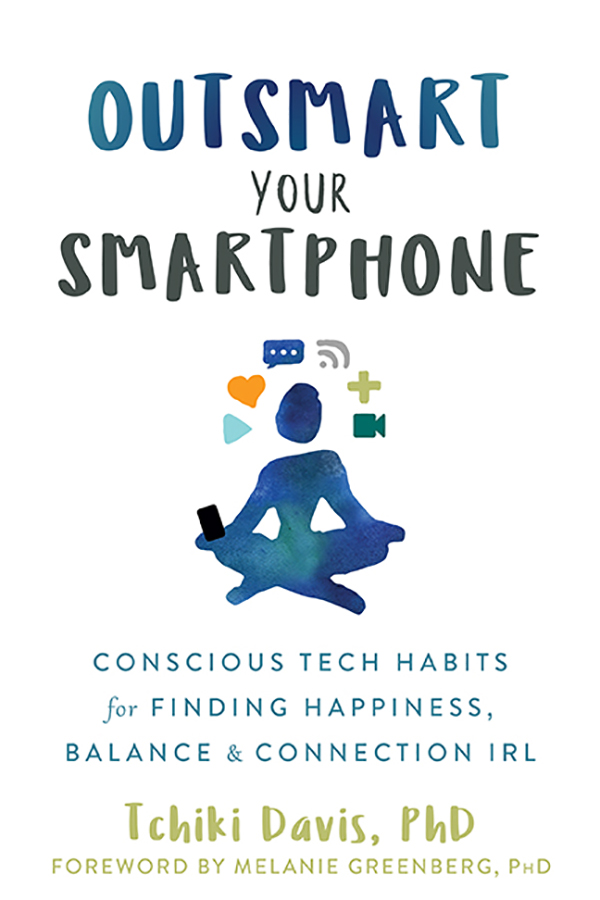By Tchiki Davis, PhD, author of Outsmart Your Smartphone
Got “Smartphone Syndrome?” Learn how to find happiness, balance, and connection online and IRL.
Technology has changed our lives dramatically. Through our smartphones and other devices, we have access to near-infinite amounts of information, tools to help us increase productivity, and even ways to socialize when we’re all alone. But has any of this made us happy?
Research suggests the answer is complicated. In fact, our smartphones (and other devices) just might be hurting our happiness. Maybe smartphone notifications distract us from staying present in the moment and enjoying the people we’re with. Maybe Netflix bingeing keeps us from getting restful sleep. Or maybe social media convinces us that we’re not good enough, no matter what we do. Some people believe that it is at least in part due to technology that we are more depressed and lonelier than ever.
So, what can we do? Do we all have to throw our smartphones into the ocean and go cold turkey? Not necessarily. Instead of using our smartphones in ways that hurt happiness, we can learn to use them in ways that generate happiness. In my new book, Outsmart Your Smartphone, I explain how to build happiness in the digital age…without throwing away your phone.
Here are some tips from the book to help you begin to outsmart your smartphone:
1. Stay in the present moment
In our technology-crazed world, instead of spending even a second alone with ourselves—our thoughts, emotions, and whatever else is in there—we reflexively turn to our phones for entertainment, comfort, or distraction. That’s why a key skill for happiness in the technology age is learning how to stay in the present moment—for example by learning how to manage our fear of missing out, limiting our technology use in small but intentional ways, and by taking mindful moments. When we take time to do these things, we remind ourselves what we’re missing out on when we give all our attention to our phones.
2. Make meaningful connections
The great irony in the age of technology is that we have more ways to connect than ever, yet we have never been more disconnected in the ways that matter for our health and happiness. We seem to be running into trouble because the way we relate to each other (both online and offline) is not helping us feel meaningfully connected. So, it’s key to change how we relate, for example by learning how to stop our smartphones from hurting our in-person interactions, focusing our attention on others (rather than ourselves) when we’re online and offline, and communicating kindly via text. By learning these skills, we can more easily connect with others in the ways that fuel happiness.
3. Learn how to manage your emotions without your phone
Among a sample of people who took the well-being quiz on my website, the people who tended to be the happiest had high self-compassion, positivity, and resilience—all skills related to managing emotions. It makes sense that managing emotions is so important for happiness now in technology age because when we build these skills, we no longer need to rely on our smartphones to boost our happiness, ease our boredom, or calm our anxiety—we can improve our mood on our own.
4. Be your authentic self both on- and offline
For most of us, our social media profiles are merely presentations of who we think we should be and not reflections of who we really are—it seems that many of us no longer feel safe showing our true selves. But this is exactly what we need to do now in the digital age to cultivate happiness. By being our true selves (online and IRL), we remove the giant weight from our shoulders, and have an easier time liking ourselves and developing healthy self-esteem.
 Tchiki Davis, PhD, is a technology consultant; writer of the blog, Click Here for Happiness, for Psychology Today; and cocreator of online programs that have helped more than a million people worldwide find balance and joy.
Tchiki Davis, PhD, is a technology consultant; writer of the blog, Click Here for Happiness, for Psychology Today; and cocreator of online programs that have helped more than a million people worldwide find balance and joy.


 2024 Peace Playbook: 3 Tactics to Avoid Clashes with Your Partner
2024 Peace Playbook: 3 Tactics to Avoid Clashes with Your Partner